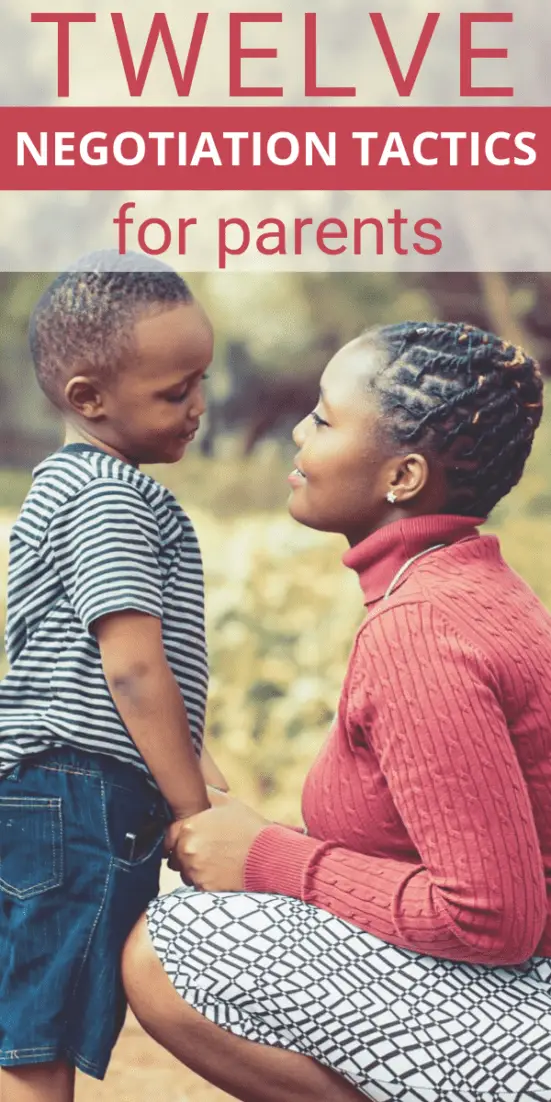I recently read a book by one of the FBI’s top negotiators and so much of what he offered in the book resonated with me as a parent. Yes, you read correctly, this FBI agent taught me a great deal about negotiating with kids.
You’re with me, right?
You know those moments when you feel like you’re being held hostage by your child?
Well, here are a few negotiation tips from Chris Voss, author of Never Split the Difference.
12 Things an FBI Agent Taught Me about Negotiating with My Kids

#1 – “How” / Open-Ended / Calibrated Questions
Here is an example: Your child wants to watch a show and demands to watch a show. Your response, “How do you know I haven’t already worked a show into our plans?”
You child demands you to pick up his book on the floor of the back seat while you’re driving. Your response, “How am I supposed to do that?”
#2 – Be Ready for Surprises
This one is not news to us parents but none the less a good reminder. Be proactive in how your child may react and be prepared for a response. Also, be prepared with a Plan B and Plan C if Plan A goes sideways. Never underestimate your child and his ability to throw you a curve call. Getting caught off guard will not help your case.

#3 – Slow Down When Negotiating with Kids
I find this tip to work magic. Whether you need to slow down because you need to gather yourself or you might explode, to find the words to respond, or to give your child a chance to fill the voice, silence increases your chances of ending the hostage situation successfully.
#4 – Embrace a Voice
Choose a tone of voice and stick with it. Practice and determine which tone of voice works most effectively with your child.
- Direct (Firm & Kind)
- Playful (The key is to smile.)
- Calm (This one takes a lot of “ommm”.)
#5 – Start with “I’ve got bad news” or “You’re not going to like what I’m about to tell you…”
This simple introduction lowers the child’s expectations.
#6 – Label the Emotion / Tactical Empathy
This one is parenting 101 in the year 2018. Still, a good reminder. This approach can also be called “active listening” where you repeat back what you hear, label the emotion, or you match and lower their expectations.
#7 – Detach
I learned this one first from former Navy Seal, Jocko Willink. Detaching is essentially the idea that in order to keep functioning with clarity to be able to make good decisions, you need to detach from the situation at hand.

#8 – Mirroring – We are drawn to what is similar. We want to be understood. We want to be heard.
Chris Voss says, “By repeating back what people say, you trigger this mirroring instinct and your counterpart will inevitably elaborate on what was just said and sustain the process of connecting.”
- Repeat the last three words
- Acknowledge the child’s words
- Speech patterns
- Body language
- Tempo
- Tone of voice
- Vocabulary
#9 – Silence is Effective When Negotiating With Kids
You need to allow for the moment of silence between the conversation. This allows for the child to process, for you to process, and for you to gain some serious negotiation points.
#10 – Focus Completely & 100% on the Other Person During the Negotiation
This one encompasses many of the points already made. With mirroring, for example, you have to focus on the person. Active listening doesn’t really exist without 100% focus on the other person.
#11 – I Don’t Understand
This simple statement buys you time.
#12 – “That’s Right”
You like your child but you really want to move away from whatever negotiation you’re having with him. So, you say “That’s right” instead of “you’re right”. That statement triggers connection. In order to get to the point where you say “that’s right,” you have to actively listen to your child.
Life is a Negotiation
Life is a negotiation and negotiating with kids is no joke. Information gathering & behavior influencing is the name of the game. Each of these points above is not mutually exclusive and can be chosen a la carte. My sons are totally thrown off by #1 – open-ended questions.
I end up gathering a lot more information and they end up processing the situation a bit more. I am excited to start using these tactics with my young sons and I can only imagine how valuable these skills will be with my teenagers.
Marnie

